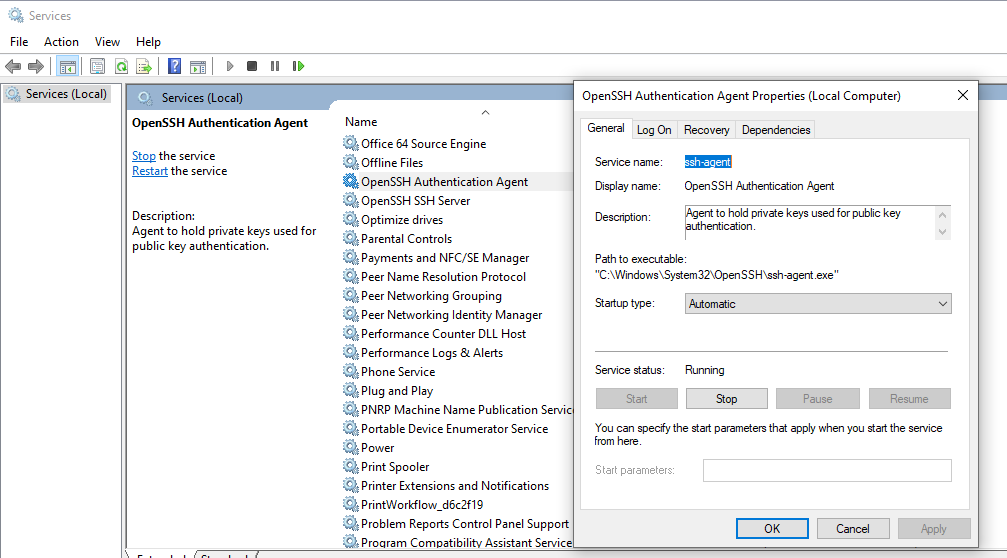Article version: GitHub AE
Ssh Key Agent
Article version: GitHub AE
After you've checked for existing SSH keys, you can generate a new SSH key to use for authentication, then add it to the ssh-agent.
Jan 14, 2021 SSH agent forwarding allows you to use your private, local SSH key remotely without worrying about leaving confidential data on the server you’re working with. It’s built into ssh, and is easy to set up and use. What Is an SSH Agent? Your public SSH key is like your username or identity, and you can share it with everybody. Oct 22, 2019 SSH Agent Forwarding can be used when you’re SSHing from Windows into WSL. You leave your keys on Windows only. I’m not using WSL right now: I have a development container on a remote Debian host and I use VS Code to SSH into it and remotely develop. Mar 03, 2020 SSH-agent on Linux, WSL and Windows 3 March, 2020. SSH-agent remembers SSH Public Key authentication, which can be time-limited by the user. This avoids the user having to type the password for each SSH connection, especially relevant to using Git over SSH.

SSH-agent on Linux, WSL and Windows 3 March, 2020. SSH-agent remembers SSH Public Key authentication, which can be time-limited by the user. This avoids the user having to type the password for each SSH connection, especially relevant to using Git over SSH. If you are using Git Bash, turn on ssh-agent: # start the ssh-agent in the background ssh-agent -s # Agent pid 59566 If you are using another terminal prompt, such as msysgit, turn on ssh-agent: # start the ssh-agent in the background eval $(ssh-agent -s) # Agent pid 59566 Add your SSH key to the ssh-agent: ssh-add /.ssh/idrsa.
In this article
If you don't already have an SSH key, you must generate a new SSH key. If you're unsure whether you already have an SSH key, check for existing keys.
If you don't want to reenter your passphrase every time you use your SSH key, you can add your key to the SSH agent, which manages your SSH keys and remembers your passphrase.
Generating a new SSH key
Open TerminalTerminalGit Bash.
Paste the text below, substituting in your GitHub AE email address.
This creates a new ssh key, using the provided email as a label.Note: If you are using a legacy system that doesn't support the Ed25519 algorithm, use:
When you're prompted to 'Enter a file in which to save the key,' press Enter. This accepts the default file location.
At the prompt, type a secure passphrase. For more information, see 'Working with SSH key passphrases'.
Adding your SSH key to the ssh-agent




Before adding a new SSH key to the ssh-agent to manage your keys, you should have checked for existing SSH keys and generated a new SSH key. When adding your SSH key to the agent, use the default macOS ssh-add command, and not an application installed by macports, homebrew, or some other external source.
Ssh Agent Show Keys
Start the ssh-agent in the background.
If you're using macOS Sierra 10.12.2 or later, you will need to modify your
~/.ssh/configfile to automatically load keys into the ssh-agent and store passphrases in your keychain.First, check to see if your
~/.ssh/configfile exists in the default location.If the file doesn't exist, create the file.
Open your
~/.ssh/configfile, then modify the file to contain the following lines. If your SSH key file has a different name or path than the example code, modify the filename or path to match your current setup.Note: If you chose not to add a passphrase to your key, you should omit the
UseKeychainline.
Add your SSH private key to the ssh-agent and store your passphrase in the keychain. If you created your key with a different name, or if you are adding an existing key that has a different name, replace id_ed25519 in the command with the name of your private key file.
Note: The
-Koption is Apple's standard version ofssh-add, which stores the passphrase in your keychain for you when you add an ssh key to the ssh-agent. If you chose not to add a passphrase to your key, run the command without the-Koption.If you don't have Apple's standard version installed, you may receive an error. For more information on resolving this error, see 'Error: ssh-add: illegal option -- K.'
Add the SSH key to your GitHub account.
If you have GitHub Desktop installed, you can use it to clone repositories and not deal with SSH keys.
Ensure the ssh-agent is running. You can use the 'Auto-launching the ssh-agent' instructions in 'Working with SSH key passphrases', or start it manually:
Add your SSH private key to the ssh-agent. If you created your key with a different name, or if you are adding an existing key that has a different name, replace id_ed25519 in the command with the name of your private key file.
Add the SSH key to your GitHub account.
Start the ssh-agent in the background.
Add your SSH private key to the ssh-agent. If you created your key with a different name, or if you are adding an existing key that has a different name, replace id_ed25519 in the command with the name of your private key file.
Add the SSH key to your GitHub account.
Further reading
Ssh Key Agent
- 'About SSH'
- 'Working with SSH key passphrases'
